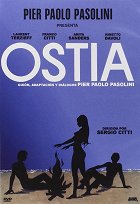Ohjaus:
Sergio CittiKuvaus:
Mario ManciniSävellys:
Francesco De MasiNäyttelijät:
Laurent Terzieff, Franco Citti, Anita Sanders, Ninetto Davoli, Lamberto Maggiorani, Gianni PuloneJuonikuvaukset(1)
A group of men find a woman lying unconscious in the grass and carry her to two brothers, who are living in their childhood home. The three of them duly embark upon a game that explores the many gradations between attraction and repulsion. Based on a screenplay co-written with Pasolini, Citti tells the story of drifters in search of themselves, whose internal unease shapes the ways in which they treat one another; violence is always latent. Citti devotes as much time to the characters as he does to the city and beach landscapes of Ostia, a suburb of Rome. Incest, rape, sexual orientation, patricide – these people’s experiences lies between the rules of Catholicism and the motives of psychoanalysis, and are acted out in a symbiosis of documentary images and theatrical burlesque: cynical and tender, frivolous and dark, full of broken taboos. (Berlinale)
(lisää)Arvostelut (1)
Ostia, the place where Romans traditionally enjoy the sea; yet one of them is not rejoicing; incongruity by someone who elevated life to eternal holidays and updated within themselves the traditional Pasolini-like Roman scavengers as well as the eternity of biblical stories against the backdrop of the transience of anarchism of fleeting Lumpenproletariats, who did not find their place in society, which offered them the only place it could create for them - prison, however, cannot bind the brothers in dialectics in which Abel is disrupted by an antithesis moving forward towards that transience, which keeps going further and leaves behind its sons as imprints of a butt in the sand after sex on the beach, washed away by the eternal tide and carried away by the only ebb, which allows those who have not found a place to rest in the wrong place in the water womb, the female womb, from which only discord, sadness, life, and confusion are born.
()
